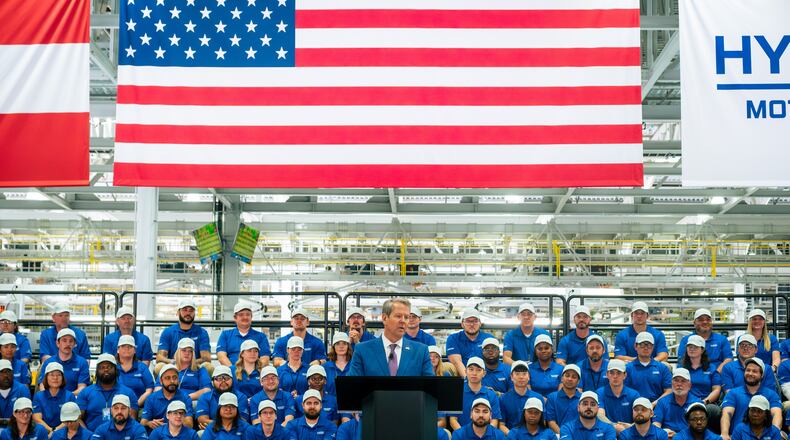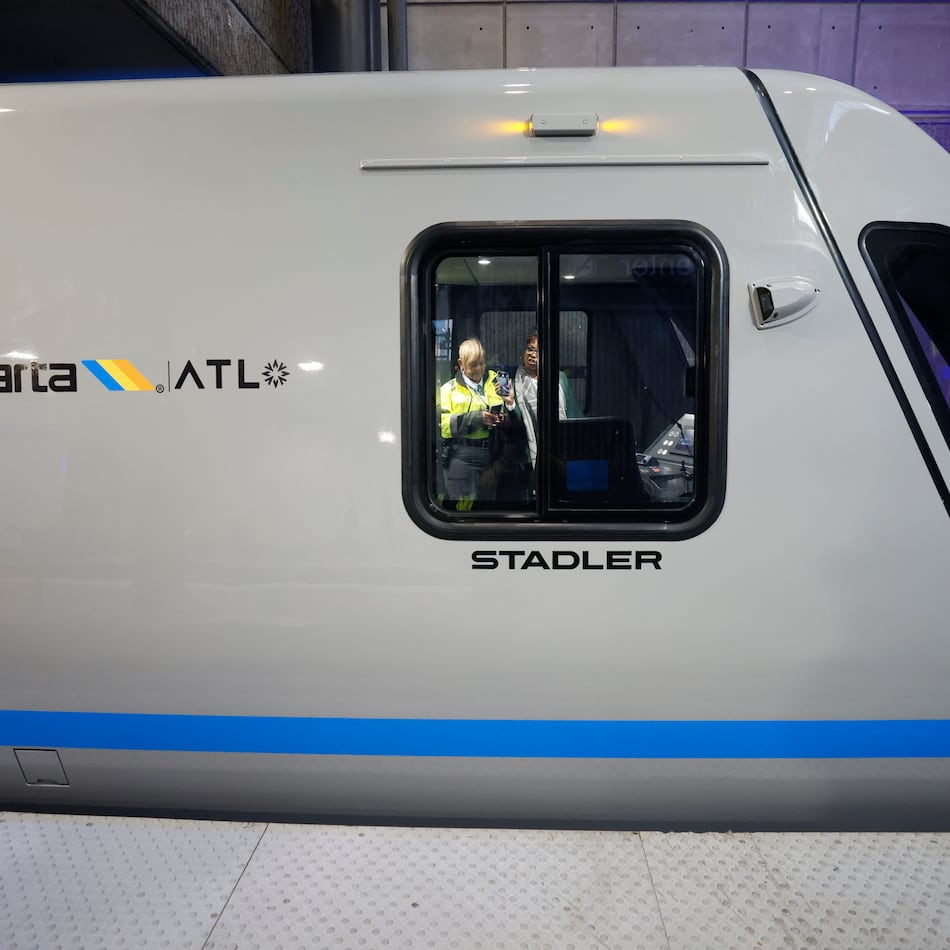As an unprecedented federal immigration raid descended on Georgia’s most prized economic development project, Gov. Brian Kemp and his staff scrambled to get a handle on the unfolding crisis.
The Republican governor, not apprised in advance about the federal immigration action, contacted President Donald Trump’s aides for details on the raid on the Hyundai Metaplant campus in southeast Georgia, which resulted in roughly 475 arrests and sparked a diplomatic crisis between the U.S. and South Korea.
Kemp’s communications team wrestled over a statement in response to the arrests at the construction site for a battery factory on the campus. They even sliced the word “excited” from an early draft as advisers debated whether to distance the governor and his administration from the automaker.
And his aides faced a crush of questions from officials, journalists and voters about the fate of a nearly $2 billion taxpayer-backed incentive package approved by state and local officials.
A review of more than 100 pages of internal communications obtained in a Georgia Open Records Act request provides a behind-the-scenes glimpse of the raw emotions and scramble for information within Kemp’s office as the governor and his aides worked to manage the crisis.
They reveal how little state officials knew about the raid in advance, and how quickly they sought to contain the fallout while preserving Georgia’s longstanding ties with Korean officials, Hyundai and its suppliers.
The tensions never erupted into public view, and Kemp and his staff maintained support for the $12.6 billion joint development between Hyundai Motor Group and LG Energy Solution while stressing that its workers must comply with state and federal immigration laws.
Some feared the Sept. 4 raid, the largest in the history of the Homeland Security Investigations division of the federal Immigration and Customs Enforcement, could imperil the Metaplant or the state’s relationship with Hyundai. But Hyundai recently announced the next phase of expansion to its massive project off I-16 near Ellabell, a testament to Georgia’s partnership with Hyundai and Korea.
Still, the raid has had tangible consequences. Hyundai executives say the visa process needs to be recalibrated, and the electric vehicle battery plant will be delayed at least two months.
Political leaders, meanwhile, have worked to calm frayed nerves. Kemp has moved to downplay the fallout. So has Trump, who days after the arrests tried to reassure foreign firms that the U.S. still values their investment and workforce.
‘Daylight’
On Sept. 5, the morning after the raid, Kemp’s staff rushed to hammer out a response while also fine tuning a statement that same day about his decision to dispatch Georgia National Guard troops to Washington.
Kemp spokesman Carter Chapman circulated an internal draft including a line that any company receiving incentives from the state must follow state and federal laws, while adding that “we remain excited about the jobs this facility will bring to this community when completed,” referring to the Metaplant.
Credit: Open records request
Credit: Open records request
Minutes later, Kemp’s communications director Andrew Isenhour advised him in the text chain to remove the word “excited” because “at this point we may need to put daylight between us and Hyundai without directly calling them s----- for sneaking Koreans in on non-work visas when they could’ve and should’ve been using Americans.”
He also suggested in the text chain, which did not include Kemp, that Chapman give Hyundai a heads-up on the statement, “even though it appears they haven’t been as good of partners to us with all this coming out.”
In a statement Tuesday to The Atlanta Journal-Constitution, Chapman said Georgia is already experiencing “the generational benefits from this historic investment and as we do with all of our partners, our state will continue to work with Hyundai on fulfilling their commitment to create good paying jobs for hardworking Georgians.”
He added: “There is nothing referenced in these messages that contradicts or changes that fact.”
Credit: J. Scott Trubey/AJC
Credit: J. Scott Trubey/AJC
Kemp, too, is making clear there’s no distance between him and Hyundai. He recently confirmed a visit with Hyundai executives during his upcoming trade mission to South Korea and has touted the automaker’s investment around the state.
Georgia and South Korea share such deep economic ties that Kemp made the nation his first overseas trip as governor. It’s a business alliance that has expanded far beyond its humble beginnings.
South Korea opened a consular office in Atlanta in 1976. About a decade later, Georgia opened a trade office in Seoul. It wasn’t until 1996 that Georgia landed its first major Korean manufacturer in Covington.
Now, Kia Motors operates a factory in West Point. SK Battery America has an EV battery factory in Jackson County with another under construction between corporate cousin SK On and Hyundai in Bartow County. Korea now ranks among the state’s top trade partners. But the Hyundai Metaplant is the crown jewel of that partnership.
“We have a great relationship with the Hyundai folks, with their suppliers, with our other foreign investors,” Kemp told reporters in Savannah last week. “I do not think this one blip on the radar is going to affect 40 years of direct foreign investment coming into our state.”
‘I spoke to POTUS about it’
Kemp texted his senior staff on Sept. 7 with an updated statement from Hyundai, which said it “failed to ensure” its workers followed employment verification processes and would implement “stronger oversight measures.”
He also shared a message from Trump’s chief of staff, Susie Wiles, who said she was continuing to investigate the scope of the operation.
“Apparently DHS was working on this for some time,” read the message from Wiles that Kemp shared. “I’ll keep you updated as I get details. I spoke to POTUS about it and he is asking if we are able to extend/correct visas so as not to disrupt the work.”
Pat Wilson, Georgia’s economic development commissioner, responded in a text that he was hopeful that federal authorities can arrange an expedited process “to get the correct visas issued so the company can get vital employees back expeditiously.”
Since then, Hyundai Chief Executive Jose Munoz has joined a chorus of international business leaders and politicians who have called for an overhaul of the visa process for high-skilled temporary workers.
“We are a very serious company,” Munoz said. “We are compliant with all types of regulation in all the markets where we operate.”
And Trump said he wanted foreign firms with massive investments in the U.S. to “bring their people of expertise for a period of time to teach and train our people how to make these very unique and complex products.”
“I don’t want to frighten off or disincentivize Investment into America by outside Countries or Companies,” he posted on social media.
‘Great embarrassment’
The messages started pouring into Kemp’s office hours after the raid. One voter e-mailed Kemp directly to call it a “great embarrassment” to the state before asking whether the governor was attending an upcoming festival in rural Folkston.
Others were harsher, demanding immediate answers about Hyundai’s business practices. Local and national reporters deluged Kemp’s staff with questions. So did South Korean outlets, prompting Chapman to ask his colleagues how respond to the influx.
By noon on Sept. 5, he sent a note to his team: “We’ve gotten asked by pretty much everybody.”
Among those seeking answers were elected officials. Republican state Rep. Soo Hong, a close Kemp ally and one of the state’s top Korean-American officials, gave Kemp’s team a heads up about what she’s told constituents.
“While Georgia deeply values its strong partnerships with Korean companies that contribute to our economy, businesses operating here must follow the law — just as Koreans expect of foreign companies in their own country.”
Credit: Courtesy photo
Credit: Courtesy photo
About the Author
Keep Reading
The Latest
Featured





